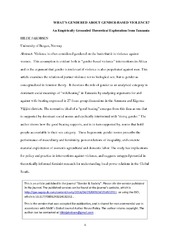What’s Gendered about Gender-Based Violence? An Empirically Grounded Theoretical Exploration from Tanzania
Peer reviewed, Journal article
Accepted version

View/
Date
2014-08Metadata
Show full item recordCollections
Original version
https://doi.org/10.1177/0891243214532311Abstract
Violence is often considered gendered on the basis that it is violence against women. This assumption is evident both in “gender-based violence” interventions in Africa and in the argument that gender is irrelevant if violence is also perpetrated against men. This article examines the relation of partner violence not to biological sex, but to gender as conceptualized in feminist theory. It theorizes the role of gender as an analytical category in dominant social meanings of “wifebeating” in Tanzania by analyzing arguments for and against wife-beating expressed in 27 focus group discussions in the Arumeru and Kigoma-Vijijini districts. The normative ideal of a “good beating” emerges from these data as one that is supported by dominant social norms and cyclically intertwined with “doing gender.” The author shows how the good beating supports, and is in turn supported by, norms that hold people accountable to their sex category. These hegemonic gender norms prescribe the performance of masculinity and femininity, power relations of inequality, and concrete material exploitation of women’s agricultural and domestic labor. The study has implications for policy and practice in interventions against violence, and suggests untapped potential in theoretically informed feminist research for understanding local power relations in the Global South.
Publisher
SAGEJournal
Gender & SocietyCopyright
Copyright 2014 by The AuthorRelated items
Showing items related by title, author, creator and subject.
-
Paralegal Services and the Fight Against Gender-Based Violence and Other Gendered Injustices in Tanzania, The Case of Women's Legal Aid Centre (WLAC)
Kigodi, Henry Michael (Master thesis, 2013-05-30)Gender-based violence (GBV) is a key dimension which has brought attention across gender stakeholders in Tanzania regarding its prevalence. It is a phenomenon which we face every day from household levels to national levels. ... -
Managing sexual and gender-based violence (SGBV) in Liberia: Exploring the syncretisation of Western and traditional approaches
Reddy, Dashakti (Master thesis, 2014-05-14)Background: Sexual and gender based violence (SGBV) is endemic to Liberia. Children are particularly impacted. The health of and justice for those impacted by SGBV are the concern of the government of Liberia (GOL), local ... -
Rooted flexibility: social reproduction, violence and gendered work in the Indian city
Cowan, Thomas Grant (Journal article; Peer reviewed, 2021)Drawing on feminist marxist and feminist geography scholarship the article develops the concept 'rooted flexibility' to examine the latent frictions between flexible labour regimes and the rooted, gendered demands of social ...